From Nothing to Something with R.N.G.
The 4th wave of the Creator Economy: User-Governed Collectives
Preliminary Musings
Someone once told me there are three types of people: talkers, thinkers and doers. For a while I have thought about these as mutually exclusive categories. Recently though I have come to think about it in the context of a Venn diagram:
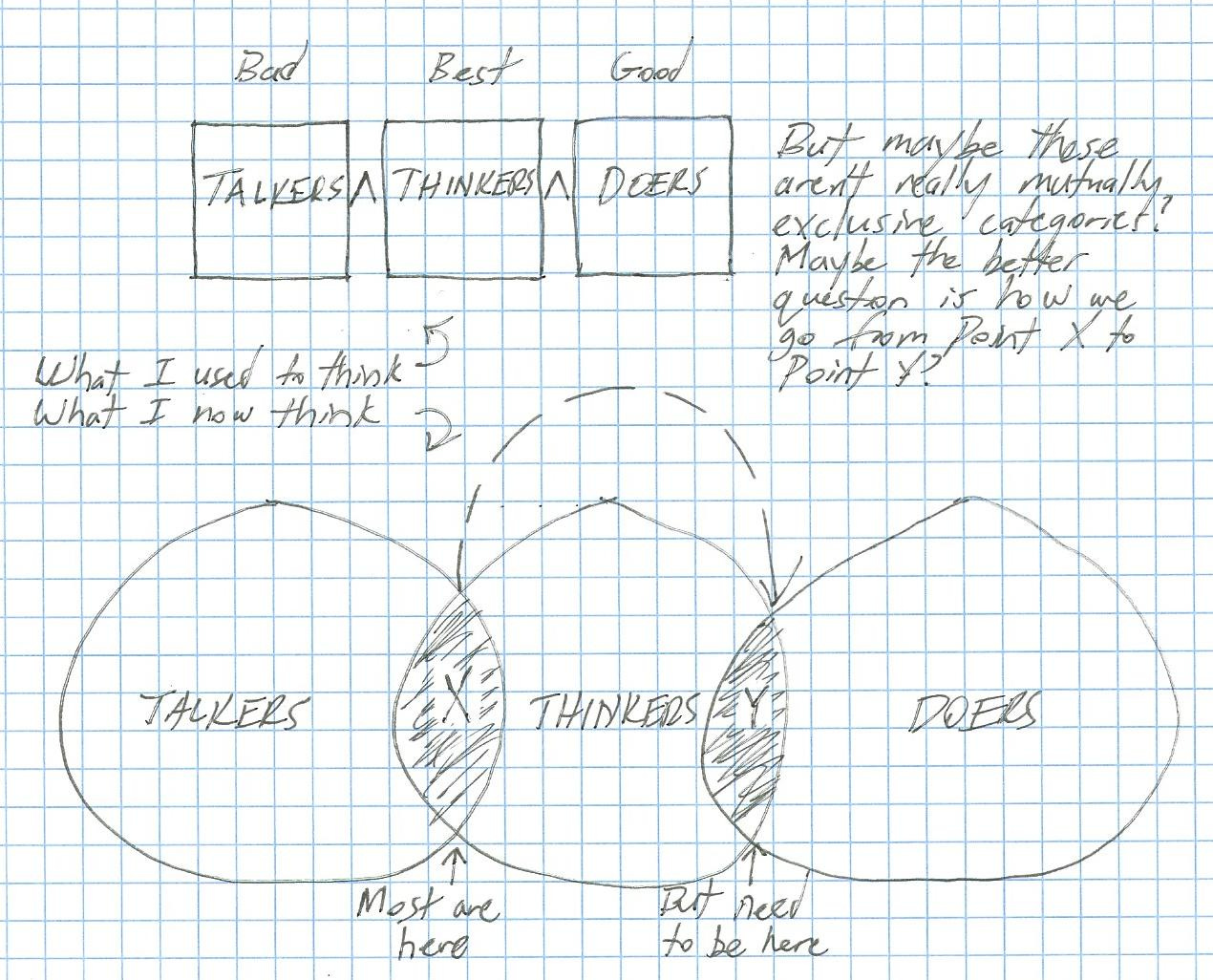
Reframed in this way, we are all thinkers -- the question is what we do with thought: talk or do?
In recent weeks I have been thinking a lot about how we can create a forum whose utility scales in proportion to, not inversely with, the expansion in talent across our network -- a kind of "social scalability".
In "Money, blockchains, and social scalability", Nick Szabo wrote:
Social scalability is the ability of an institution –- a relationship or shared endeavor, in which multiple people repeatedly participate, and featuring customs, rules, or other features which constrain or motivate participants’ behaviors -- to overcome shortcomings in human minds and in the motivating or constraining aspects of said institution that limit who or how many can successfully participate.
The social scalability of an institutional technology depends on how that technology constrains or motivates participation in that institution... One way to estimate the social scalability of an institutional technology is by the number of people who can beneficially participate in the institution. Another way to estimate social scalability is by the extra benefits and harms an institution bestows or imposes on participants, before, for cognitive or behavioral reasons, the expected costs and other harms of participating in an institution grow faster than its benefits. The cultural and jurisdictional diversity of people who can beneficially participate in an institution is also often important, especially in the global Internet context. The more an institution depends on local laws, customs, or language, the less socially scalable it is.
How do fragments of affinity and interest become "socially scalable"? Since Li Jin popularized the term, much has been written about the evolution of the "passion economy". SignalFire recently released a Creator Economy Market Map, describing the three layers of the evolution of the creator economy:
Layer 1: Foundational Media Platforms. Since the late 2000s, we witnessed the birth of platforms like YouTube, Instagram, iTunes, Spotify, and more recently Snapchat, Twitter, Medium, Twitch, TikTok, etc. Platforms help creators get discovered and establish an audience by investing heavily in their recommendation and curation algorithms — they solved the distribution problem for creators.
Layer 2: Monetizing Influencer Reach. Once top creators had built an established audience who trusted what they had to say, brands started to recognize the return on investment of paying creators to harness their on-platform reach to advertise products and services.
Layer 3: Creators as businesses. This is where we are today! Having developed fandoms that follow them off-platform, creators can become full-fledged businesses with multiple revenue streams beyond ads. Companies have arrived to help creators earn money by selling products such as premium content, merchandise, books/ebooks, newsletters, or selling services such as fan engagement, coaching, consulting, speaking engagements, etc.
After reading through this excellent piece, I was struck by (1) the frenetic pace of activity in the creator economy ecosystem, and (2) the fact that none of the 100+ companies in the market map appeared to be working on the next layer that has already begun to materialize: Layer 4: User-Governed Communities. As I wrote about in Into the Depths of the $WHALE, I've been obsessed by the idea of social tokens as a foundational incentive layer for creators and curators to distribute value to their communities as they grow:
I've never loved the term UGC (user-generated content). It's so broadly used now that it seems to have lost all meaning. I wish I could appropriate those three letters and use them to describe something more meaningful, like "user-governed communities".... When you look at the largest UGC platforms today -- think Roblox, Minecraft, GTA Online, YouTube, TikTok, Instagram -- the user is a mere participant with finite moves in a predefined sample space (UGC). What if there were a better way, one in which the user becomes a co-creator of an emergent collective?
Nearly all the "passion economy" startups are stuck in the mindset of, "how do we help creators monetize engagement", when they should be asking, "what if we reframed the creator-collective relationship entirely?" When I saw FaZe Clan take over an entire Soho block during the 2019 Fortnite World Cup, it was simultaneously glorious yet mystifying to me: how could it be that the only way you could prove fandom was to wait overnight for a merch drop and a 10 second meeting with your favorite streamer? Could this relationship somehow transcend the transactional into the co-creative?
Nichanan Kesonpat wrote in Creators, Communities, and the Gray Space in the Middle:
It feels like we're entering the next evolutionary phase of online communities, where you and others are not just members of the same chat room talking about a shared interest, but are stakeholders of the community itself, in a system with baked-in incentives to reward you for the value you put in. The community is able to evolve a product alongside the creators.
Over the last 6 months, there has been a step function change in the development of primitives enabling User-Governed Communities, primarily as a result of the experimentation around money games happening in decentralized finance that I explored previously. DeFi innovations like Uniswap's evolution of trustless exchange where price is determined formulaically through "constant product market making", Compound's governance token for community-driven governance, and Synthetix's mintr contract enabling staking rewards for liquidity mining are all foundational to the development of user-governed communities. Without them, UGC (user-governed collectives) would be, well ... just UGC (user-generated content).
Instinctively, after experiencing first-hand the thrill of DeFi’s money games over the last few months, I knew this stuff was going to change the world. But what if all the traditional finance bros were right … that inherently, DeFi, Governance, Social and Creator Tokens all have no value because they aren't backed by anything real?
The only way I could find out for sure was by trying it out....
A Tribe Called R.N.G.
From these humble musings, about a week ago, I kicked off a social experiment called $RNG:

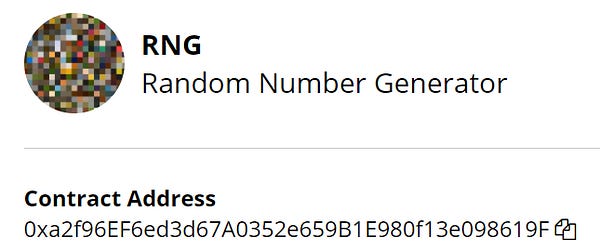
At the time of this Tweet, I had only loose ideas of what to do. All I knew was the broad direction I wanted us to travel. I remember Naval saying on a podcast once that the best way to achieve your goals is to write them down and broadcast them to everyone you know. And so more than anything, the Tweet was an excuse to get pot committed.
Discord is ground zero for some of the most interesting community experimentation happening on the Internet. Its integration with a huge range of bots, as well as web3 tools like Roll (for token issuance), Collab.land (for token-linked access), Snapshot (for on-chain governance) and Sablier/Gnosis Safe (for token vesting) all adds up to a user-experience with a huge amount of potential (but also much friction and complexity). How could one make sense of it all? Only by jumping straight into the fire.
The R.N.G. Discord launched about a week ago now. I'd never spun up a Discord server before, and it didn't take long after setting one up before I realized I would need help to take this to the next level. Piers Kicks at Delphi, who I had spoken to the week before on his podcast Metaverse Musings, directed me to a guy on Fiverr who had experience setting Discord servers up before. One day and 50 euros later, we had our turbocharged Discord. Together with some bold branding created on the fly by the talented Tina He at Pace Capital (and author of the FakePixels Newsletter), we were in business:
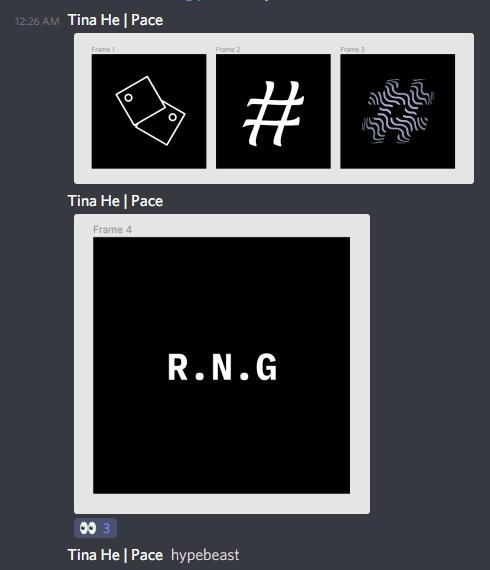
Now, we just needed to get some people in and start distributing tokens. Anthony Schiller had the distinct honor of being the first non-founder recipient of R.N.G.:

After bringing on about a dozen more "lesser dalmuti" who each received 5k $RNG token grants (more below), we were ready to start slowly opening the experiment up.
But Wait, What is It?
It's telling that we didn't even have a description for what R.N.G. is until 4 days after launch....
R.N.G. is a curated, members-only social club for the gaming/interactive community (founders, investors and enthusiasts). A crypto ERC-20 token called $RNG serves as the unifying force for disparate interest groups through a unifying layer of access, coordination and incentives. Early members get in for free and own substantially all (80%) of the upside of the endeavor. It is a social experiment at web3 scale, as we organically bootstrap a community of thinkers and tinkerers from diverse backgrounds in seeking to drive the creation of "something from nothing". Our objectives include:
1. Establishing a virtual meeting space for founders, investors and enthusiasts in the gaming space:
a knowledge share (articles/books/podcasts);
a place for founders to seek advice and help from other founders/investors;
a product testing ground for games (alpha/beta invites); and
a virtual water cooler for chatter.
2. Creating a virtual social club for interactive entertainment, including:
dedicated channels for popular games;
dedicated channels for popular sports;
regular tournaments for poker and other online games;
a place to chat about TV, movies and all things Internet culture; and
a full suite of Discord-native games.
3. Hosting concerts, roundtables, teach-ins, and happy hours with some of the most interesting characters in the gaming space in a virtual metaverse of unprecedented scale.
4. Introducing social token experimentation to gamers not familiar with crypto primitives in a collaborative community experiment.
5. Proving that “something” can be sustainably created out of nothing, and to bring us together in a world where we’ve never been more connected, yet felt more alone.
At the core of R.N.G. is the $RNG token. $RNG is a smart contract deployed on the Ethereum blockchain, with publicly viewable code here. The R.N.G. community and the $RNG token are inextricably linked, as R.N.G. is segmented into five hierarchies, tracking Richard Garfield's game The Great Dalmuti. In the R.N.G. community, one's rank and access are a function of $RNG held:
- GreaterPeons (0 $RNG): General Channels Only
- LesserPeons (100 $RNG): GreaterPeons + All Other Text Channels (Gameclub, Sport, TV/Film/Music/Internet, Tech, Finance)
- Merchants (500 $RNG): LesserPeons + Fun Bots
- LesserDalmuti (5,000 $RNG): Merchants + Special Events
- GreaterDalmuti (100,000 $RNG): Admins
The first 1,200 Merchants automatically receive 500 $RNG on signup. After this initial group, the next batch of members may come in as LesserPeons with 100 $RNG grants (unless Merchant grants are extended by the community), and will be required to earn their way up to Merchant status through their engagement in the Discord.
The way we have set up the Discord channels allows everyone to self select into the subcommunities they care about. For instance, if FPS is your genre and you don't care about Card games, Netflix or Sports, you can self select into those channels and mute the others. This layout was actually quite controversial when the Discord was smaller, as the common refrain was that the server felt cavernously empty. But it has turned out to be a critical part of organizing the mass collective, The approach allows for a seamless blending of the "town hall" with the idea of smaller sub-communities. We are still tinkering, but I think we are on the right track.

A sense of shared purpose and a transparent token model is the fabric unifying the disparate subcommunities comprising the R.N.G. community.
Given how core the token model is, it’s worth expanding on. We used Roll to deploy the $RNG contract to the Ethereum blockchain, utilizing some of its standardized issuance parameters: only 10m $RNG can ever be issued, with a current supply of 3.2m, 300k of which we contributed to Roll as the "issuance fee" (each project sets this in their discretion) and the remainder of which is available for public float. Every month until July 2023, the remaining supply of $RNG will vest into the issuer's account, until there is a 10m fully diluted token supply.
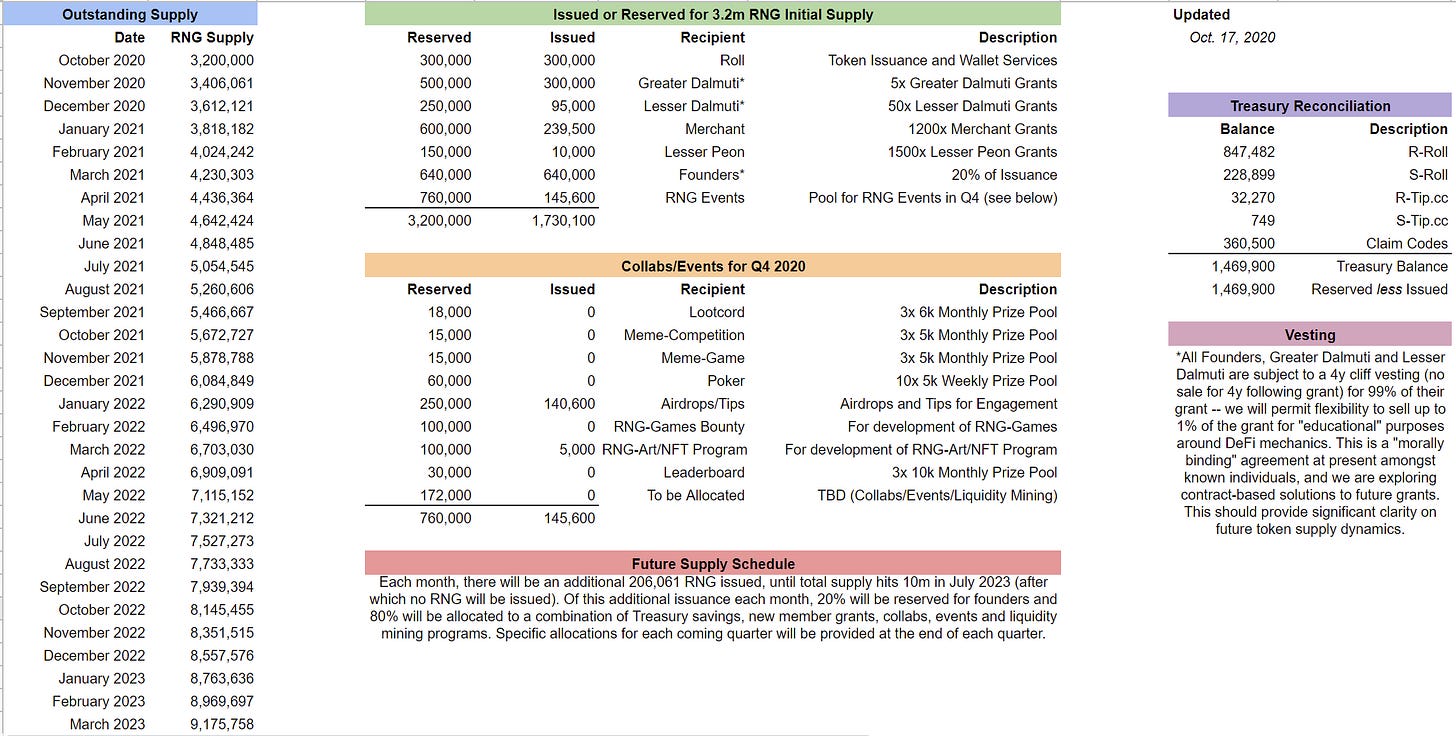
Transparency around the $RNG budget is a high priority, and we have encouraged the R.N.G. community to provide their feedback on it. In particular, we have allocated a significant portion of the $RNG budget to gaming- and art-related events and competitions over the coming quarter. My partner Sam and I are particularly excited to see what collaborations we can unlock in the course of introducing our extended network into the R.N.G. ecosystem.
Some early community members provided thought provoking feedback around whether a token distribution akin to "fair launch" / zero founder pre-mine model is a more suitable construct for a token-based project. Over the last two months, I've spent a decent chunk of time participating in these "fair launch" DeFi projects. Despite my personal affinity for $BASED Protocol in particular, I have concluded that most fair launch projects suffer from four critical defects that I am keen not to repeat in the $RNG context:
(i) despite being open for everyone to "mine" on a level playing field (by staking ETH or stablecoins), the crypto whales who have large pre-existing stacks of wealth will inevitably gain a significant advantage over the mining horizon;
(ii) fair launch projects with no Treasury reserve are significantly hampered in their ability to incentivize productive work and collaborations;
(iii) by emphasizing the money game as a core part of community formation so early on, the retention of the community inevitably drops precipitously as the pool of new buyers wanes over time; and
(iv) DeFi is comically inaccessible from a UX and transaction cost standpoint, ensuring that only the sharks are left to play, and the marginal new experimental entrant is left holding the bag.
And so, despite “fair launch” being in vogue, I am not sure it is the correct model. There have been many deals we ultimately passed on out of concerns that the founder equity pool was too low. Why then the crypto community has vilified meaningful founder stakes is somewhat baffling to me. If it's a "one and done" launch, I could understand the concern, but if it's a project that's requires ongoing content, coordination and curation, the absence of a strongly incentivized founding team and healthy Treasury reserves significantly impairs project flexibility and the ability to marshal community resources effectively. While I am fascinated by emerging governance mechanics like decentralized autonomous organizations (DAOs), I think decentralization for decentralization's sake is overrated.
To me, the key is the identification and redistribution of latent value back to the community through compelling engagement loops, and the encouragement of long-term incentive models for group coordination. Everyone granted 5k or more $RNG tokens is subject to a "morally binding" (amongst known individuals) 4y cliff vesting schedule (no sale prior to 4y), a feature which for at least the next several years has resulted in one of the most egalitarian token distributions of any token project I am aware of.
At a later time I am going to explain why I view this feature to be so important to the long-term success of the project. This relates to the topic of "liquidity mining" at the end of Q4 2020 or the start of 2021, when we will create a pool of $RNG to encourage the community to become market makers for $RNG on Uniswap, much the same way $WHALE now has ~$1.2m of liquidity on Uniswap at a $65m+ fully diluted market cap from liquidity miing programs. For the time being, however, having a market price for $RNG is not a priority; rather, it’s all about building community and content flywheels.
Building a Plane While Flying
In the first few days after launching, we had the luxury of controlled experimentation amongst a largely known set of gaming investors, founders and enthusiasts. We wanted to test whether multiple groups with differing backgrounds and motivations could be brought together through a shared token coordination layer, while retaining the agency to settle into subcommunities aligning with their core interests.
In particular, we launched several "engagement-related" competitions with payouts in $RNG, including a Leaderboard based on activity in the Discord and various game bots. Some of our biggest issues in the early days were pretty comical, like Pokemon bots gone wild and spawning in every channel (making administrative functions and announcements difficult) and the crazy amount of bot-related activity skewing the stats on the leaderboard (with some players literally sending thousands of messages in a day on bots like t-lootcord)!
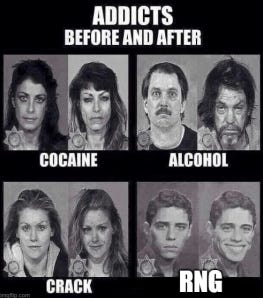
A few days in, I concluded it was time for us to lift off. An early collaboration with Coin Artist (and our first Greater Dalmuti) brought in our first external community to extend our experiment outside of mainstream gaming circles:

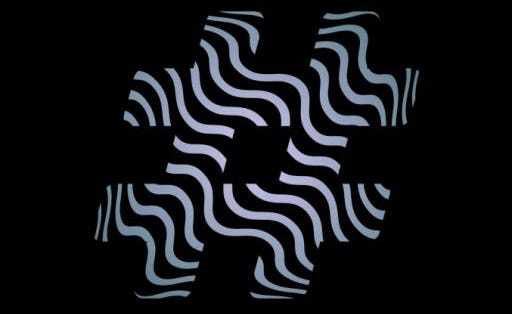
Marguerite (or “Coin Artist”) is the CEO of Blockade Games, developer of the cyberpunk puzzle Neon District, and at the forefront of the intserection between DeFi x Gaming x Social Tokens. A quick tour of her Medium blog reveals the depth of her thinking on these topics, borne out of her roots as an artist and puzzle creator. I find myself blown away by the creative force of her team, and even more so by the Neon District community's engagement in tackling some of craziest challenges ever created.
The other big inspiration behind the creation of R.N.G. was WhaleShark, a topic I have written about previously in Into the Depths of the Whale. WhaleShark and the $WHALE community represent the best of the social token ecosystem that I wanted to share with the mainstream gaming community. I was honored when WhaleShark accepted my invitation to become a Greater Dalmuti on behalf of the $WHALE community:

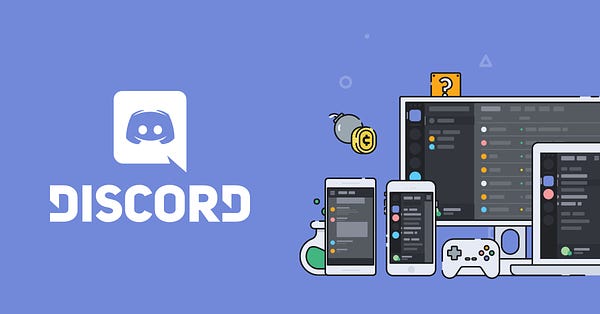
Despite being familiar with the $WHALE community, nothing could have prepared me for the onrush that happened after WhaleShark tweeted news of this collab on the 14th. Hundreds of whales poured into R.N.G., doubling our size from 200 members to 400 within an hour. It could have been a precarious moment for our nascent project, representing as it did a significant clash of cultures between gaming and crypto circles, in addition to the fact that a significant proportion of the Whale community heralded from across the globe (with a heavy SE Asia concentration). Most of those participating in R.N.G. prior to the $WHALE community barely even understood what a social token was. For the first 15 minutes, I was desparately trying to maintain our non-anonymous, networking-driven culture with {Full Name} / {Org} nicknames, as a condition to granting the 100 $RNG tips I was giving to all new members for intros. Let's just say I gave that one up pretty quickly...
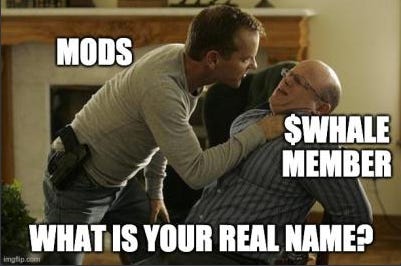
Within a day, R.N.G. once again settled into equilibrium. From the influx of whales arrived some of our most active community members, several of whom have since become our most trusted mods. Naturally, the Discord quickly segmented into the anonymous whales vs. the known gaming community we had assembled prior to that point. Yet the structure of R.N.G. permitted groups to self-select into their desired communities. It's precisely the cultural dissonance of having so many disparate groups gathered under one roof that's been the best part of this whole experiment. My favorite discussions have been those related to governance, and Raph Koster in particular has been instrumental in helping us step back and reflect on the nature of the community we are building. There is much food for thought to digest in the voluminous pages of Raphkoster.com, stemming from the idea that in some very real sense, this is all just yet another MMO….
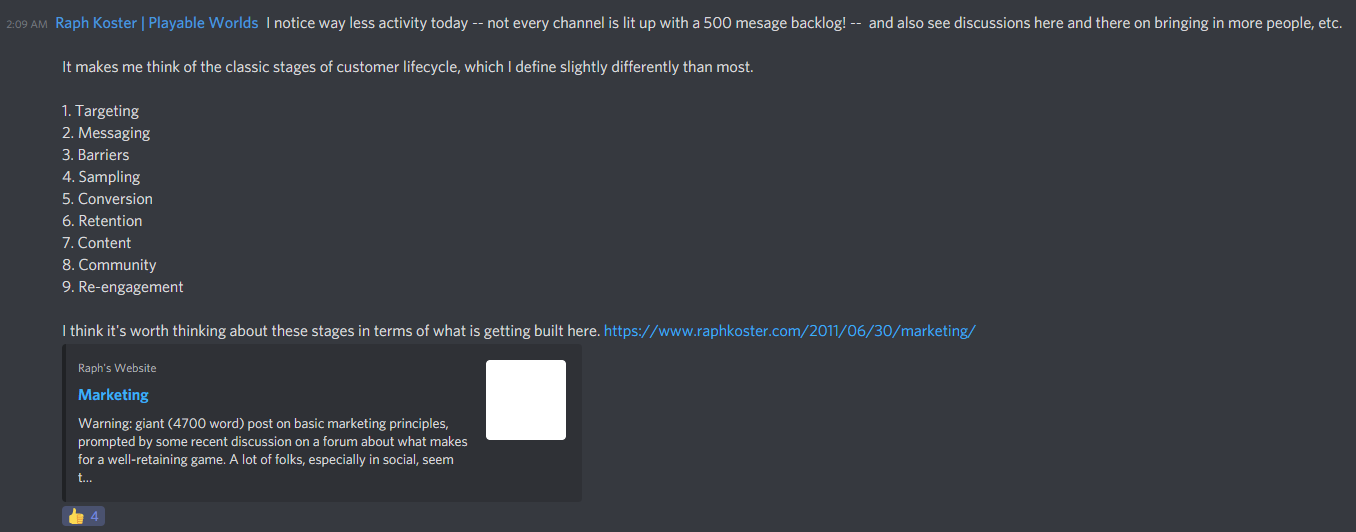
One Week In, and Many Years to Come
It's hard to believe we are only one week into this social experiment. We are now at 898 members as of this writing and continuing to grow strong. For our next thousand members, my partner Sam and I are heavily focused on bringing in members of the interactive entertainment ecosystem into our budding collective, especially those who have never before dealt with crypto primitives. I'm also excited about encouraging digital artists, game developers and creatives of all kinds to view R.N.G. as something of a virtual home, where you can meet folks from radically different backgrounds from all over the world, and yet feel like you’re part of one community with a coherent vision. It's still too early to tell where all this is going to ultimately settle, but I'm already grateful to all the community managers, content curators, digital artists, moderators and others who have come together to bring what was just an idea a week ago into reality at the speed of light. We are in the "blank slate" stages of this movement, and I know that the coming weeks are going to be an absolute blast.
What is R.N.G.? Perhaps Angie said it best:


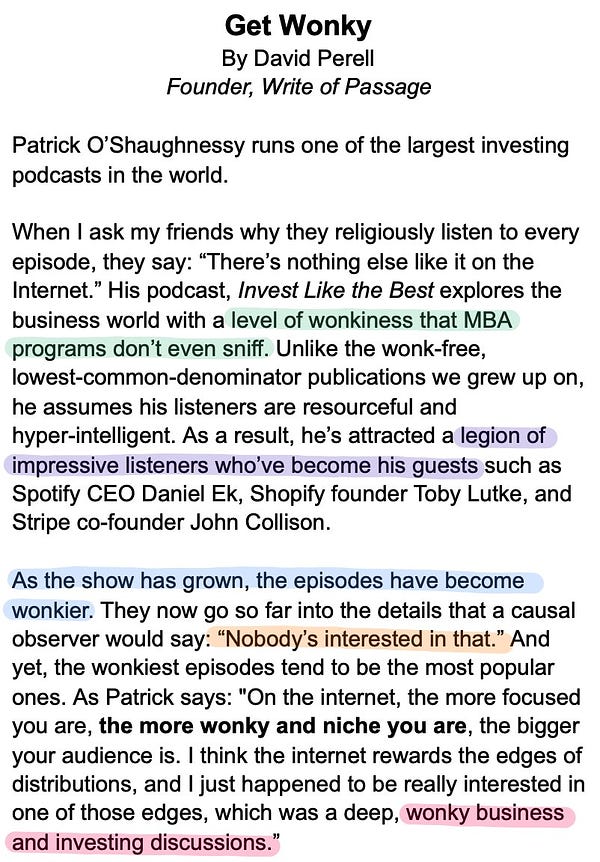
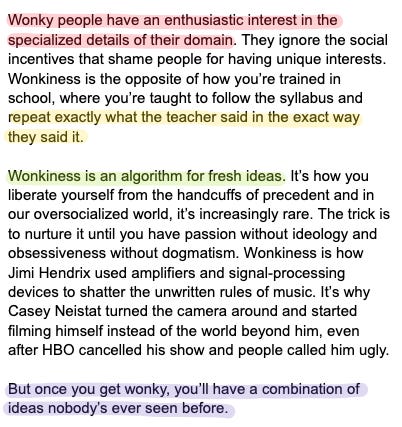
Come join the wonky cult that is R.N.G.: discord.gg/q9tPpen. Those 500 $RNG Merchant seats are not going to last forever. :)

